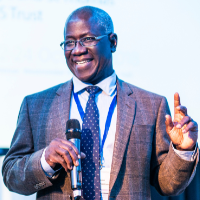
 June 2023
June 2023
What is your current role?
I’m a paediatric consultant specialising in research on sickle cell disease.
Sickle cell disease is an inherited disorder which causes people to have unusually shaped red blood cells. These can block blood vessels and do not live as long as healthy red blood cells. The condition particularly affects people with African and Caribbean family backgrounds.
I’m also a professor of paediatric haematology at King’s College London and a consultant in paediatric haemoglobinopathies (blood disorders) at Evelina London.
I work globally with colleagues in Nigeria, Zambia, Kenya, Ghana and Lebanon, as well as the UK, to raise awareness of the importance of early diagnosis and treatment of sickle cell disease. We aim to help improve longevity and quality of life for people diagnosed.
I’m also the founding chair of the National Haemoglobinopathy Panel supporting services across the country, and I established the world renowned Academy for Sickle Cell and Thalassaemia (ASCAT) conference. Now in its 17th year, this brings together education and cutting-edge science through networking and conferences.
What’s your background?
I’m Nigerian by background, from Kaduna state in North West Nigeria.150,000 babies are born with sickle cell disease in Nigeria each year. While there is recognition of this condition, we’re working with states and governments to improve early diagnosis and treatments.
Doing this, I felt I could make a contribution to changing the lives of patients. While I was at university in Nigeria, one of my lecturers, paediatric haematologist Professor Werblinska, was a real inspiration for me. She had such a strong relationship with sickle cell disease and it really made me want to spend more time working on it in the UK.
I found myself in some African groups and because of these groups, I can raise awareness of sickle cell and help people realise there is work being done on this. Although I don’t have direct personal experience of it, I have extended family and friends who have been affected by sickle cell disease.
It predominantly affects people of African origin and because of that there is a feeling that the attention on it could be improved.
What’s your passion?
My colleagues and I established a charity in Nigeria called SCORE (Sickle Cell Cohort Research) to offer information and support for clinicians, patient groups, parents and journalists. We work with African organisations to train scientists and lab experts to introduce screening programmes and improve the accuracy of diagnoses – early diagnosis can reduce deaths as a result of sickle cell disease by 70-80 percent.
We’ve also set up the African Research and Innovative Initiative for Sickle Cell Education (ARISE), again to work collaboratively internationally to train clinicians and have them train their colleagues.
I’m very proud of everything we’ve contributed to and achieved. Even in the UK, we’ve developed new standards and common guidelines to improve equality of access to treatments.
There are 17,000 patients in the UK with sickle cell disease and although lots of work has been done to improve understanding of the illness, there is still a stigma surrounding it, often within families. Although this is starting to change with the younger generations, who are more likely to talk to family members about it.
What’s it like to work at Evelina London?
I joined Guy’s and St Thomas’ NHS Foundation Trust in January 2003 as lead for paediatric haemoglobinopathies, and I’m proud to have seen the opening of a dedicated new building for Evelina London Children’s Hospital in September 2005. I have developed our paediatric haematology service, and we’re now a specialist centre for blood disorders, including sickle cell disease, thalassaemia, haemophilia and thrombosis. I’m so proud that Evelina London is leading in multiple clinical drug trials for sickle cell disease in the UK.

Thank you to the children and young people who have so brilliantly illustrated our blog pages.